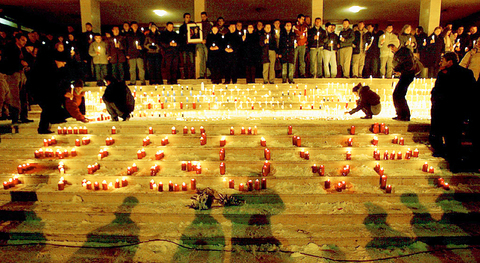Thousands of ethnic Albanians lit candles, placed flowers and flew flags at half mast yesterday in memory of Kosovo president Ibrahim Rugova, who led them for nearly two decades toward their demand for independence from Serbia.
With family at his bedside, Rugova, 61, died at his official residence shortly before midday on Saturday. He had suffered from lung cancer since September, when he was first diagnosed with the illness, and went through months of treatment.
Rugova will be buried on Wednesday in Kosovo's capital, Pristina. Five days of official mourning were declared, and mourners will be allowed to pay their last respects for two days at the parliament's headquarters.

PHOTO: EPA
Kosovo's lawmakers were to hold a commemorative session yesterday.
"Kosovo lost the president in the final run-up to independence," read the front page of Koha Ditore daily.
"There's no greater pain for the people of Kosovo," said 40 year-old Agim Zeka, a Pristina resident. "We have lost the great man."
Others like Jusuf Sina, appealed to the rest of the leaders to continue Rugova's path.
"He worked his entire life for our state," he said.
Rugova's death left a leadership vacuum in Kosovo's fraction-ridden political scene before crucial talks on whether the province should gain the independence that was his lifelong dream.
International leaders stepped up their appeals for calm and unity in the disputed UN-run province, fearing the death could trigger instability. The Serb government expressed concerns that Rugova's successor might not share his commitment to nonviolence.
The immediate effect of his death came almost immediately. The much-anticipated start of the talks between ethnic Albanians and Serb officials had been scheduled for Wednesday in Austria, but were postponed until next month.
The flags throughout Kosovo were lowered to half mast and long lines of tearful mourners visited his hillside residence in Pristina after the announcement of his death.
Rugova had been at the forefront of demands for independence since the early 1990s, when he started leading a nonviolent movement against the policies of Slobodan Milosevic, then president of Yugoslavia.
No other Kosovo politician has been held in such high regard. He won international respect through his peaceful opposition to Serb dominance, in contrast to other Kosovo Albanians now in positions of leadership, who were part of the rebel Kosovo Liberation Army that fought Serb troops.

PRECARIOUS RELATIONS: Commentators in Saudi Arabia accuse the UAE of growing too bold, backing forces at odds with Saudi interests in various conflicts A Saudi Arabian media campaign targeting the United Arab Emirates (UAE) has deepened the Gulf’s worst row in years, stoking fears of a damaging fall-out in the financial heart of the Middle East. Fiery accusations of rights abuses and betrayal have circulated for weeks in state-run and social media after a brief conflict in Yemen, where Saudi airstrikes quelled an offensive by UAE-backed separatists. The United Arab Emirates is “investing in chaos and supporting secessionists” from Libya to Yemen and the Horn of Africa, Saudi Arabia’s al-Ekhbariya TV charged in a report this week. Such invective has been unheard of

‘TERRORIST ATTACK’: The convoy of Brigadier General Hamdi Shukri resulted in the ‘martyrdom of five of our armed forces,’ the Presidential Leadership Council said A blast targeting the convoy of a Saudi Arabian-backed armed group killed five in Yemen’s southern city of Aden and injured the commander of the government-allied unit, officials said on Wednesday. “The treacherous terrorist attack targeting the convoy of Brigadier General Hamdi Shukri, commander of the Second Giants Brigade, resulted in the martyrdom of five of our armed forces heroes and the injury of three others,” Yemen’s Saudi Arabia-backed Presidential Leadership Council said in a statement published by Yemeni news agency Saba. A security source told reporters that a car bomb on the side of the road in the Ja’awla area in

US President Donald Trump on Saturday warned Canada that if it concludes a trade deal with China, he would impose a 100 percent tariff on all goods coming over the border. Relations between the US and its northern neighbor have been rocky since Trump returned to the White House a year ago, with spats over trade and Canadian Prime Minister Mark Carney decrying a “rupture” in the US-led global order. During a visit to Beijing earlier this month, Carney hailed a “new strategic partnership” with China that resulted in a “preliminary, but landmark trade agreement” to reduce tariffs — but

SCAM CLAMPDOWN: About 130 South Korean scam suspects have been sent home since October last year, and 60 more are still waiting for repatriation Dozens of South Koreans allegedly involved in online scams in Cambodia were yesterday returned to South Korea to face investigations in what was the largest group repatriation of Korean criminal suspects from abroad. The 73 South Korean suspects allegedly scammed fellow Koreans out of 48.6 billion won (US$33 million), South Korea said. Upon arrival in South Korea’s Incheon International Airport aboard a chartered plane, the suspects — 65 men and eight women — were sent to police stations. Local TV footage showed the suspects, in handcuffs and wearing masks, being escorted by police officers and boarding buses. They were among about 260 South